The Bundeswehr’s Basic Training – An Overview
The foundations for a successful military career are laid in the first three months as a recruit. What exactly happens in the Bundeswehr’s basic training?



The foundations for a successful military career are laid in the first three months as a recruit. What exactly happens in the Bundeswehr’s basic training?

For many servicemen and women, the first three months in the Bundeswehr are the most intense and also the best months of their careers. During this time, they become acquainted with everyday military life; they march, shoot and bivouac in the open air. They get to know their rights and duties and the special comradeship within the forces. Everyone has to complete the Bundeswehr’s basic training. No one gets around basic training.
The young men and women are divided into recruit companies for the Bundeswehr’s basic training. Whether in the Army, the Air Force, the Navy, the Medical Service or the Joint Support and Enabling Service – by the end of basic training, every single trainee should have achieved “basic general military capability”.
This basic capability includes, for example, knowing why the Bundeswehr exists and what its mission is. The service personnel learn to see themselves as citizens in uniform and also that, as representatives of the forces, they must behave in an exemplary manner. Recruits practise military courtesy, as well as bedmaking and keeping their rooms tidy. In general instruction on military affairs, the young military personnel learn about the legal basis of the military profession.
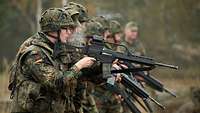
In the Bundeswehr’s basic training, the G 36 rifle is the first weapon the young military personnel are trained on.
Bundeswehr/Sebastian WilkeOf course, training in the field is also on the agenda so recruits can get to know the basic elements of action duty. Land navigation, various individual movement techniques, camouflage, concealment and deception, as well as the construction of improvised shelters, are among the topics covered. The preparation of a field meal is practised, as is weapon handling.
In addition, everyone is trained in first aid. Initial treatment of combat injuries and buddy aid are particular points of focus. Instruction in the use of radio equipment and CBRNchemical, biological, radiological, nuclear protective measures rounds off the training. In total, the Bundeswehr’s basic training covers 14 subjects over the course of 450 hours of training.
Each week, the Bundeswehr’s basic training focusses on a different topic. Apart from that, recruits exercise a lot to increase their physical fitness. During the pre-employment medical examination and at the end of the Bundeswehr’s basic training, all the young soldiers must undergo what is known as the “basic fitness test” (BFTBasis-Fitness-Test): they must pass the sprint, strength and endurance tests within 90 minutes. A swimming test is also part of the science-based examination. Even after basic training, the BFTBasis-Fitness-Test is repeated once a year to check the personnel’s physical fitness.
As of May 2019, the training concept for the Army’s basic training includes more sporting elements and takes into account other factors such as motivation and nutrition. Accordingly, the military personnel are even better prepared for demanding service in the Army. In a six-week training block, they first get physically fit before they go into action duty training together.
The other armed services, the Air Force, Navy, Joint Support and Enabling Service and Medical Service, also impart information specific to their areas during basic training. The young Navy personnel, for example, learn the first practical naval basics such as various sailor’s knots, as well as caulking leaks with wood, a saw and a hammer.
Those who fail one part of basic training will be retrained by the instructors and allowed to repeat the exam – no one is left behind.
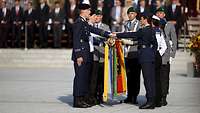
In the solemn pledge at the end of basic training, the servicemen and women swear to loyally serve the Federal Republic of Germany and bravely defend the rights and freedom of the German people.
Bundeswehr/Sebastian WilkeTowards the end of the Bundeswehr’s basic training, the solemn pledge takes place. In this public ceremony, the newly trained servicemen and women profess their loyalty to the free democratic basic order. They pledge to “loyally serve the Federal Republic of Germany and to bravely defend the rights and freedom of the German people”. At the end of basic training, there is the “inspection of recruits” in which the young military personnel can demonstrate what they have learned to experienced instructors.
After ninety intensive days, the trainees are able to be employed as guard and security soldiers. They can carry out lifesaving measures and take on simple tasks under combat conditions. After basic training, they go on to general or specialist military training to be prepared for their future activities – for example as military drivers or as machine gunners.
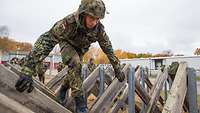
Walls and trenches are obstacles that must be overcome in battle. In order to prepare the recruits, skills, strength and endurance are trained on the obstacle course even during the Bundeswehr’s basic training.
Bundeswehr/Jane Schmidt
The flexed arm hang is one of three exercises from the basic fitness test. The serviceman or woman holds the final position of a pull-up on a horizontal bar for as long as possible. They must remain in this position for at least five seconds.
Bundeswehr/Mario Bähr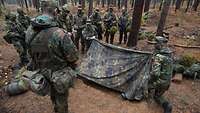
Every newcomer gets to know the two-man tent during basic training. Properly put up, it protects military personnel against rain, wind and cold during a bivouac.
Bundeswehr/Christian Thiel
Making a fire and preparing a small meal are also part of the Bundeswehr’s basic training.
Bundeswehr/Martin Stollberg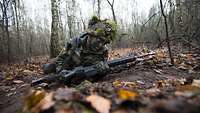
During the field training, the trainees get to know the various individual movement techniques with the G 36 rifle, such as the “low crawl”.
Bundeswehr/Jane Schmidt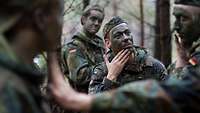
The men and women put green and black streaks of camouflage face paint on their faces. They cover their helmets with leaves, twigs and moss. All of this blurs the contours of their faces and helmets that would stand out against the forest.
Bundeswehr/Christian Thiel
Camouflaged like that, they are hardly recognisable and are protected from discovery by enemy forces.
Bundeswehr/Sebastian Wilke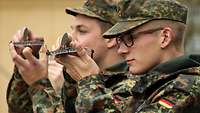
Land navigation is also an important part of the Bundeswehr’s basic training. The military personnel learn to find their destination without a mobile phone, using only maps and compasses.
Bundeswehr/Sebastian Wilke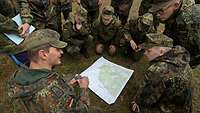
Training takes place in groups. Instructors explain and show step by step what the recruits have to do before it is time for them to “imitate and practise”.
Bundeswehr/Sebastian Wilke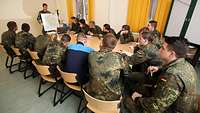
In addition to a lot of practical field training, lessons on the rights and duties of military personnel, civic education and firing techniques are also part of the Bundeswehr’s basic training.
Bundeswehr/Sebastian Wilke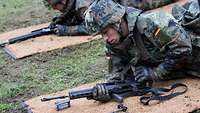
Before recruits use the G 36 rifle, they have to strip and reassemble it. Only those who know their rifles inside out can handle them in all situations.
Bundeswehr/Christian Thiel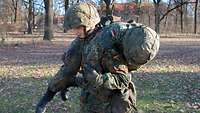
If a fellow soldier is wounded, they must be removed from the danger area quickly. That is why carrying methods are on the agenda of the Bundeswehr’s basic training.
Bundeswehr/Jonas Weber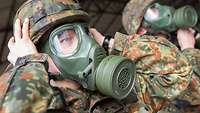
CBRNchemical, biological, radiological, nuclear defence training during the Bundeswehr’s basic training.
Bundeswehr/Jane Schmidt